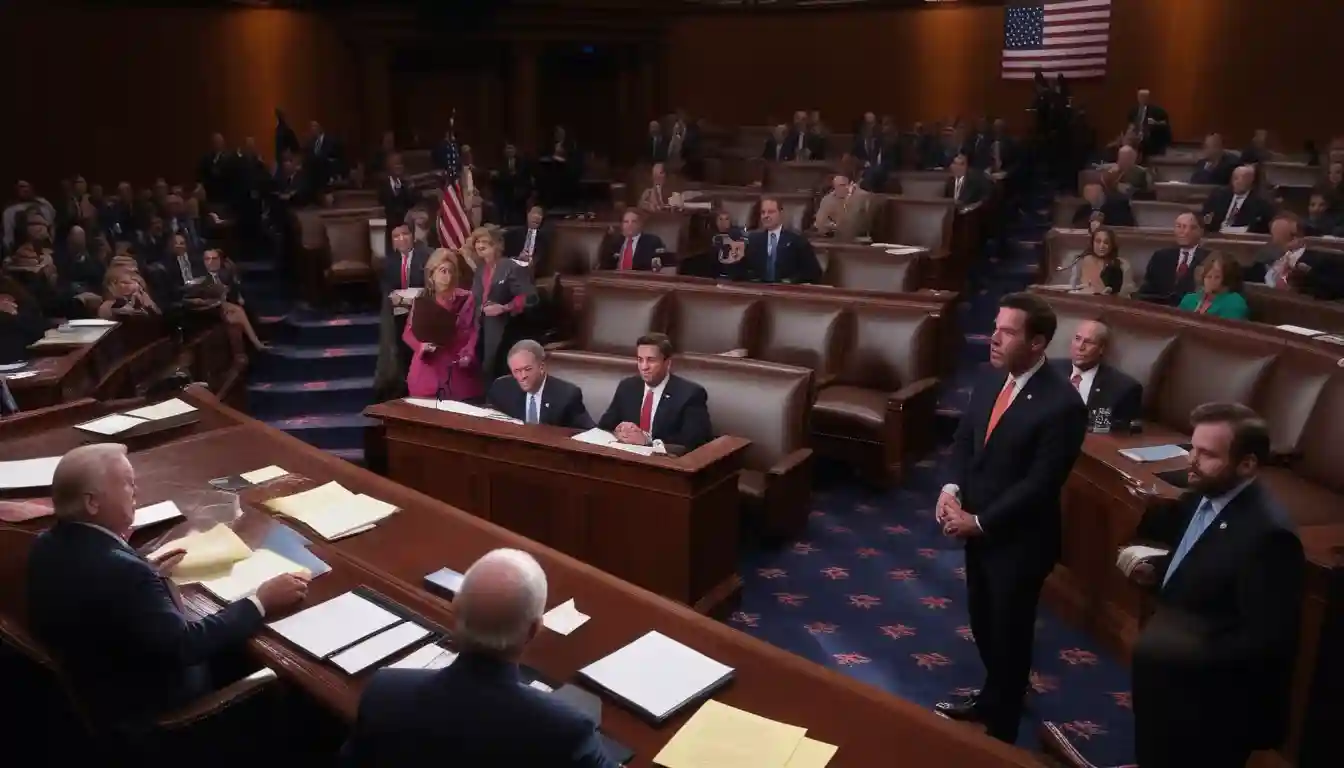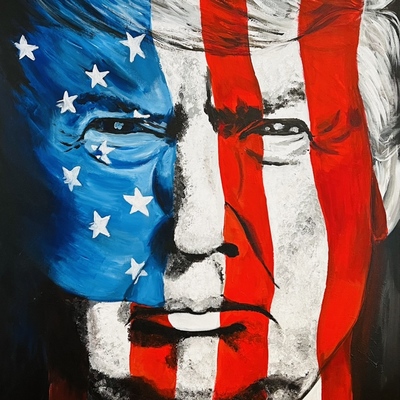
House Republicans Block Crypto Bills in Record Seven-Hour Vote Over CBDC Ban Demands
House Crypto Standoff: Freedom Caucus Halts Digital Asset Bills in Record-Breaking Vote
In the cavernous House chamber, where America's legislative future is shaped one vote at a time, the clock ticked past seven hours — then kept going. What began as a routine procedural vote to advance cryptocurrency legislation devolved into the longest open vote in House history, exposing deep fissures in the Republican majority and throwing the future of digital asset regulation into uncertainty.
As the electronic board flickered at 208-221 late Wednesday evening, with ten Republicans breaking ranks, Speaker Mike Johnson worked the floor in increasingly desperate fashion, cornering holdouts in hushed conversations that grew more animated as the night wore on. The stakes: three bills that would create America's first comprehensive federal framework for digital assets — legislation that Wall Street and Silicon Valley have awaited for years.
"We're witnessing a historic impasse that's both ideological and tactical," said a senior Republican aide, speaking on condition of anonymity. "This isn't just about crypto — it's about government surveillance, financial freedom, and who controls the dollar's future."

Freedom Caucus Plants Flag Against Central Bank Digital Currency
At the heart of the deadlock stands a determined group of conservatives, primarily Freedom Caucus members, who have drawn a line in the sand: no legislation will advance without explicit language banning a U.S. central bank digital currency , which they view as a potential surveillance tool.
"People, including the House Freedom Caucus, believe that central bank digital currency — we have to put a stake in its heart once and for all," Rep. Marjorie Taylor Greene declared, capturing the fervor driving the opposition.
The procedural rule would have allowed debate on a package of bills dubbed "Crypto Week" — including the stablecoin-focused GENIUS Act (already passed by the Senate), the market-structure CLARITY Act, and the Anti-CBDC Surveillance State Act. But hardliners want guarantees that a CBDC ban is locked in, preferably by merging it with the already Senate-approved stablecoin bill.
This demand has created a legislative quagmire. Any changes to the Senate-passed GENIUS Act would require the bill to go back to the upper chamber, potentially derailing the entire effort. Committee chairs who crafted these bills warn this approach risks losing everything in pursuit of perfection.
Trump Intervention Fails to Break Impasse
Even former President Trump's direct intervention failed to resolve the standoff. According to multiple sources familiar with negotiations, Trump brokered a potential compromise to add anti-CBDC provisions to the Digital Asset Market Clarity Act rather than the stablecoin bill — a solution that satisfied neither the hardliners nor the committee architects.
"The failure to move forward despite Trump's personal involvement shows how deeply entrenched these positions have become," noted a cryptocurrency policy expert. "We're witnessing ideology trump party unity, even with a president from their own party pushing for action."
Market Turbulence as Regulatory Clarity Slips Away
The procedural collapse sent tremors through cryptocurrency markets. Shares of crypto-related companies like Circle and Coinbase dropped as Wall Street digested the implications of continued regulatory uncertainty.
"The market was pricing in a high probability of framework clarity by August," explained a senior crypto analyst at a major investment bank. "This deadlock creates a repricing of regulatory risk that could persist for months."
For institutional investors who have been waiting on the sidelines, the delay represents another barrier to entry. Major banks have developed custody and trading infrastructure for digital assets but remain hesitant to deploy at scale without federal guidelines on stablecoins and market structure.
The Stakes: America's Digital Asset Future
If passed, the three bills would fundamentally reshape America's approach to cryptocurrency and blockchain technology. The GENIUS Act would create the first comprehensive federal framework for stablecoins, requiring full reserve backing, transparent audits, and regulatory oversight — potentially unlocking broader institutional adoption.
The CLARITY Act would end years of "regulation by enforcement" by clearly delineating when digital assets are securities versus commodities, providing certainty to issuers and exchanges. And the Anti-CBDC bill would block what critics call "surveillance currency" while potentially entrenching private-sector payment innovation.
"These bills represent the most significant overhaul of financial market structure since Dodd-Frank," said one veteran banking regulator. "The standoff isn't just about technical details — it's about America's competitive position in the next generation of global finance."
Democratic opposition adds another layer of complexity. Rep. Maxine Waters warned that the bills "were written by and for the crypto industry and will open the door for future financial crises by reducing regulation and enforcement." This partisan divide raises questions about the durability of any regulatory framework that might eventually pass.
Behind Closed Doors: The Path Forward
As leadership searches for a breakthrough, alternative strategies have emerged. One approach involves attaching a CBDC ban to unrelated must-pass legislation like defense funding. Another would split the package, passing the Senate-approved stablecoin bill separately while continuing negotiations on the more contentious measures.
"The procedural deadlock masks an underlying reality — there's still overwhelming support for regulatory clarity," explained a crypto industry lobbyist. "The question isn't if, but how and when these bills move forward."
Speaker Johnson faces the unenviable task of threading this needle while managing a razor-thin majority where a handful of members can derail legislation. His ability to forge compromise will determine whether "Crypto Week" becomes a historic step forward or a cautionary tale of missed opportunity.
Investment Outlook: Navigating the Regulatory Fog
For investors watching this legislative drama, strategic positioning remains challenging. Market analysts suggest a bifurcated approach:
First, focus on regulated stablecoin infrastructure with verifiable full reserves and strong compliance frameworks. These rails are likely winners under any regulatory scenario and could see premium valuations if federal guidelines eventually pass.
Second, maintain tactical exposure to U.S.-compliant exchanges and custody solutions that would benefit from market structure clarity, while hedging against continued regulatory uncertainty through diversification.
"The most probable outcome is a stablecoin-first approach, with the House eventually passing the clean Senate bill under pressure to bank a win," suggested a policy director at a major crypto venture fund. "But timeline risk remains substantial, with any changes potentially pushing final resolution into late 2025 or beyond."
As the clock continues to tick, America's digital asset future hangs in the balance — caught between the immovable force of ideological conviction and the unstoppable momentum of financial innovation. For now, the longest vote in House history stands as a testament to how digital currency has become not just an economic battleground, but a philosophical one that cuts to the heart of American governance.
Investment Thesis
| Category | Key Details |
|---|---|
| Core Issue | House procedural gridlock over "Crypto Week" bills; thin coalition for comprehensive crypto legislation. Stablecoin clarity (GENIUS Act) is the near-term priority. |
| Market Risk | Legislative uncertainty = volatility. Headlines (amendments, Senate delays) will impact crypto prices. |
| Key Bills | GENIUS Act (Stablecoins): Highest chance if clean. CLARITY Act (SEC/CFTC lines): Lower odds. Anti-CBDC Act: Contentious, low passage odds. |
| Probable Outcomes | 40%: Clean GENIUS. 25%: GENIUS + narrow CBDC limits. 10%: Full package w/ CBDC ban. 25%: Stalemate. |
| Investor Playbook | Best Case (A/B): Long regulated stablecoins, tokenized cash, compliant exchanges. Worst Case (D): Offshore advantage, regulatory overhang. |
| Tactical Trades | Barbell Strategy: High-compliance stablecoins + long-dated calls on winners. Event Vol: Trade rule votes, amendments. |
| Risks to Watch | Hardliners forcing CBDC ban → Senate delays. SEC enforcement clashes. Global competition (EU MiCA). |
| Key Metrics to Track | Whip counts, amendment texts, stablecoin float/redemptions, SEC/CFTC statements. |
| Red Flags | GENIUS amended with CBDC ban → timeline slips. Stablecoin reserve shortfalls. Macro shocks diverting legislative focus. |
| Hedges | Long volatility, diversify stablecoin exposure, rotate to BTC during gridlock. |
NOT INVESTMENT ADVICE